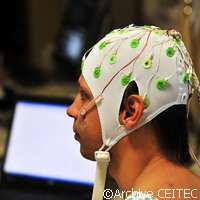Scientists uncover deja vu mystery

In a groundbreaking study, researchers from the Czech Republic and the United Kingdom have discovered a link between the déjà vu phenomenon and structures in the human brain, effectively confirming the neurological origin of this phenomenon. Despite past studies investigating this phenomenon in healthy individuals, no concrete evidence had ever emerged ... until now. The study is presented in the journal Cortex.
Led by the Central European Institute of Technology, Masaryk University (CEITEC MU) and Masaryk University's Faculty of Medicine in the Czech Republic, researchers discovered that specific brain structures have a direct impact on the déjà vu experience. The findings of their study showed that the size of these structures are considerably smaller in the brains of the people experiencing déjà vu, compared with individuals who had no personal experience with déjà vu.
The team from CEITEC MU, along with colleagues from other Brno research institutions as well as the University of Exeter in the United Kingdom succeeded in providing huge insight into this phenomenon that has perplexed many over the years.
The team observed how small structures in the brain's medial temporal lobes, in which memory and recollections originate, were considerably smaller in individuals with the occurrence of déjà vu than in individuals who have not experienced déjà vu. Their findings also showed that the more often the examined individuals experience déjà vu, the smaller the brain structures are.
"One hundred and thirteen healthy subjects underwent a structural examination of their brain by means of magnetic resonance and subsequently by using a new sensitive method for an automatic analysis of brain morphology (source-based morphometry) [and] the size of individual brain regions was compared among the individuals who have never experienced déjà vu and those who have experienced it," said lead author Milan Brázdil from CEITEC.
"Except for the presence of the examined phenomenon, both groups of individuals were fully comparable. When we stimulate the hippocampus, we are able to induce déjà vu in neurological patients. By finding the structural differences in hippocampus in healthy individuals who do and do not experience déjà vu, we have unambiguously proved that déjà vu is directly linked to the function of these brain structures. We think that it is probably a certain small "error in the system" caused by higher excitability of hippocampuses. It is the consequence of changes in the most sensitive brain regions which probably occurred in the course of the development of the neural system."
Experts say déjà vu, while fascinating, is not an uncommon experience. Between 60% and 80% of healthy individuals have reported occasional occurrences of déjà vu.














